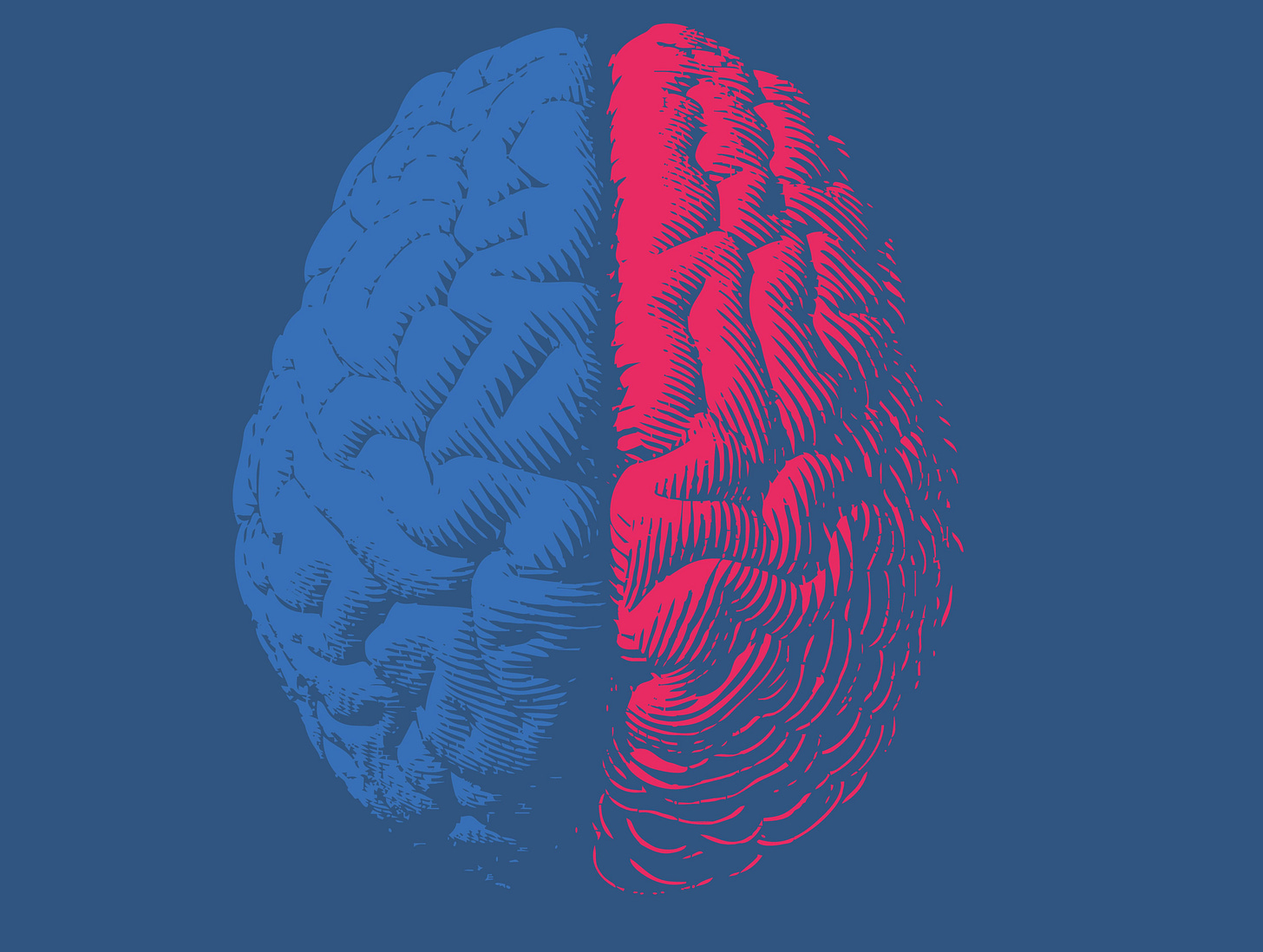E-Pluribus | February 27, 2023
One brain, two brain, red brain, blue brain (hat tip, Dr. Seuss); defanging Roald Dahl; and DEI takes another hit.
A round-up of the latest and best writing and musings on the rise of illiberalism in the public discourse:
Roger Knowles: Red Brain, Blue Brain?
Many causes have been posited for the stubborn tribalism and polarization in our political system. At Discourse Magazine, Roger Knowles suggests that neuroscience may offer some insights into what’s going on in the good guys vs. bad guys framing with which many see themselves and those with whom they disagree.
Lately, there seems to be very little consensus between the political divisions in our country on almost any topic. Some historians are even comparing the current political divide to the late 1850s, when the Supreme Court ruled on the Dred Scott case setting the stage for the onset of the Civil War. A recent survey supports that analogy, suggesting that a significant number of Americans on both sides of the political divide think that the country could—and even should—head to some type of divorce. Setting aside the wisdom (or lunacy) of that position, as any marriage counselor will attest, when two sides are considering a divorce, the first thing that should be addressed is the finding of root causes that might be driving the division.
Factors such as parents’ ideology, race, ethnicity, gender, age and economic status correlate very strongly with ideology. But looking at these factors over the decades, it is hard to find a pattern that could easily explain the recent polarization that has occurred. However, one relatively recent change is the evolution of how Americans get their news—and the editorializing that goes with the news. We live in an environment in which the information one person receives is radically different from what the next receives. A recent study in the Proceedings of the National Academy of Science demonstrated that even those who get their news from cable are consistently seeing more bias between how stories are portrayed.
If current political polarization is being driven by how we receive information (Fox vs. CNN, for example), generating distinct perceptions and emotions (“The election was stolen!” “They are inciting a riot!”) and how we decide what to do (like who we vote for and how we engage in debate), then neuroscience has a lot to offer on this subject. At its most basic level, the brain has three main jobs to do: bring in sensory information about what is happening in the world, generate a perceptional awareness and feeling of what one is experiencing and decide what to do about it. Our brains are taking a wide range of politically tinged inputs—TV shows, radio programs, news articles, debates with friends—and based on differences in our brain pathways, they’re determining our political opinions and actions—often in ways that clearly predict where we might fall on the political spectrum.
Read the whole thing.
Christopher J. Scalia: Roald Dahl and the vanilla factory
Christopher Scalia’s latest for the Washington Examiner is worth it for the brilliant title alone, but the details are worthwhile as well. Scalia writes that while some may be put off by Roald Dahl’s work, that hardly justifies sanitizing it for everyone.
This compulsion not to offend is especially strange regarding Dahl, whose work is distinctively unsettling. His publishers were once proud of that. A 1982 edition of one of his novels features a blurb from the Times Literary Supplement: “For some time now Roald Dahl has been the most popular living novelist that we have for children, despite, or sometimes possibly because of, lapses in taste that have not always found equal favour among adult readers.”
Sensitivity readers identify and destroy these “lapses in taste.” The Telegraph’s list of the changes to Dahl’s works includes many instances of changes to common words, presumably to align the books with the Diversity, Equity, and Inclusion Style Guide. They’ve trimmed a lot of fat — two dozen instances of the word, to be precise, in the name of body positivity. Twelve appearances of the word father are gone, either removed or replaced by parents. Mothers suffer even more in these unchivalrous edits: 14 instances, never to be seen again. These particular words are not gender-neutral, you see, so they must be replaced.
Both mother and father have been escorted out of the very first sentence of one of Dahl’s most popular works, Matilda, which now reads: “It’s a funny thing about parents.” This shift to gender neutrality is absurd because it’s a general reference to both types of parents, not a comment that could conceivably be construed as an insensitive assumption about a particular child’s guardians. Besides, it would be wise to ward off especially sensitive readers before the biting second sentence about mothers and fathers: “Even when their own child is the most disgusting little blister you could ever imagine, they still think that he or she is wonderful.” These books are not supposed to be for the easily offended.
Read it all.
Ari Blaff: UNC–Chapel Hill Drops DEI Hiring Requirement amid Growing Backlash
One of the more intrusive iterations of Diversity, Equity, and Inclusion culture is the demand that those applying for university positions agree in advance to affirm that very culture. Ari Blaff reports for National Review that University of North Carolina at Chapel Hill has sworn off the practice that many professors see as an imposition on their academic freedom.
The University of North Carolina (UNC) at Chapel Hill announced its plans to ditch diversity, equity, and inclusion (DEI) requirements from hiring criteria following a board of governors meeting on Thursday.
The college will no longer “solicit nor require an employee or applicant for academic admission or employment to affirmatively ascribe to or opine about beliefs, affiliations, ideals, or principles regarding matters of contemporary political debate or social action as a condition to admission, employment, or professional advancement,” the resolution reads.
The statement added that hiring practices will further prohibit “statements of commitment to particular views on matters of contemporary political debate or social action contained on applications or qualifications for admission or employment included as criteria for analysis of an employee’s career progression.”
Read it all here.
Around Twitter
Excerpts from a Wesley Yang thread on the inexcusable behaviour of medical professionals “treating” children with gender-bending drugs and the inexcusable behaviour of some in the media as well:
Excerpts from a Glenn Greenwald thread on how the media treatment of the lab leak theory is just part of a trend:
And finally, Thomas Chatterton Williams on how many Twitter users’ combative style isn’t the way to a better society:








